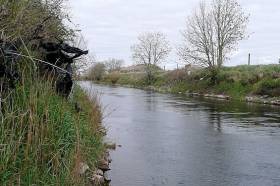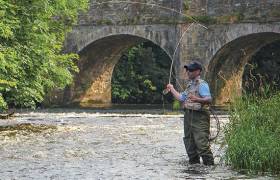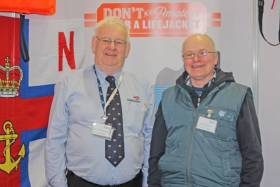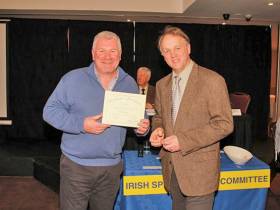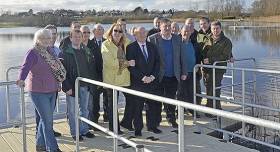Displaying items by tag: angling
Claregalway Man Convicted Of Poaching Offences
#Poaching - A Claregalway man was convicted of an illegal fishing offence at a sitting of Galway District Court recently.
Niall O’Gorman, with an address at Kiltrogue, Claregalway, was found guilty on 2 February of possession of a net and obstruction of fishery officers at Kiltrogue on the Clare River on 27 May 2015.
Fines of €500 were issued on each charge, totalling €1,000, and costs were awarded to Inland Fisheries Ireland to the amount of €600.
Judge Mary Fahy heard evidence that fishery officers on patrol in the early hours of 27 May observed the defendant in a kayak, servicing and cleaning a net, before placing it in a bag. He then proceeded to a second net, fixed in the river, where the officers approached him.
O’Gorman made an attempt to flee in the kayak, necessitating one of the fishery officers entering the water to apprehend him.
The solicitor for the defendant asked for leniency, stating that her client had made a stupid mistake, that he was of limited means and that he accepted the serious nature of the offence.
Judge Fahy said that the defendant was obviously not a teenager and had acted in a very immature way. She commented further that she had heard a number of fishery cases recently and that this was the most serious, necessitating an officer to enter the water in the early hours of the morning.
The nets were forfeited, although the kayak was returned to O’Gorman, who gave an undertaking in court not to use the kayak for anything other than kayaking in the future.
Commenting on the case, John Conneely of Inland Fisheries Ireland commended the fisheries officers involved. He said: “Protection of fish stocks is vital to maintaining an extremely valuable natural resource for the benefit of local and tourist anglers. Recreational angling in Ireland is worth over €836 million to the economy and supports over 11,000 jobs.
"IFI staff are committed to protecting that resource, working in difficult conditions and bad weather to do so, and their vigilance and dedication is highly valued.”
Dr Ciaran Byrne, CEO of Inland Fisheries Ireland, said: “The Clare River has unfortunately been the victim of environmental crime once again. This activity must be stopped to ensure that the important recreational amenity and its biodiversity are conserved for future generations.”
Brown Trout Angling Guide on River Annalee
Inland Fisheries Ireland (IFI) has announced the launch of a new guide for brown trout angling on the River Annalee in the upper reaches of the River Erne system.
The Annalee River is one of the main tributaries of the Upper Erne and provides quality wild brown trout fishing over much of its 60 kilometres length. It is one of the premier trout fisheries in the area capable of producing trout up to two to three pounds in weight and has previously hosted national fly-fishing championships based on the quality of the angling available.
The new guide, which was prepared in consultation with the Cavan, Laragh and Bunnoe district angling clubs, comes as a fold-out water-resistant leaflet providing a map and associated information identifying key angling stretches, access points and relevant angling regulations for the area. It also identifies where visiting anglers may obtain permits to fish as well as providing some helpful advice regarding recommended fly patterns for use throughout the season.
The guide was recently launched by renowned local angling guide, author and fly-tier Peter O’Reilly at the Angling Ireland stand during the Ireland Angling Expo at Cloghran, Swords, Co. Dublin.
Following the launch of the new guide, Dr Ciaran Byrne, CEO of Inland Fisheries Ireland, commented: “Angling in Ireland is a huge recreation and sport with over 400,000 adults fishing our rivers, lakes and coastline each year. Tourist and domestic angling activity supports over 11,000 jobs, primarily in rural and peripheral areas, and contributes €836 million to the Irish economy annually.
“The continued conservation, protection, development and promotion of the resource is fundamental to maintaining and growing these figures. IFI is committed to the National Strategy of Angling Development through which these actions can be taken, subject to funding and the support of our stakeholders. The Annalee brochure is an example of IFI working with local angling interests to ensure the wonderful amenity of the Annalee is promoted to reach its full potential in terms of the local and visiting angling in support of the local community.”
The guide is available from the IFI offices or can be downloaded below
Ocean Energy, Angling & Fishing Expo in Seascapes Podcast
Hello and welcome aboard this weeks edition of your maritime programme, we have music from Molgoggers, we preview the Lewis Symposium presented by MaREI – Ocean Energy; Theory, Practice and Integration hosted by the Environmental Research Institute Beaufort Building, University College Cork by visiting the Seascapes archive and hearing from Emeritus Professor Tony Lewis ....the remarkable HMS Caroline the Battle of Jutlands only afloat survivor in Belfast soon to open as a heritage visitor attraction, Fergal Keane visits the annual Angling Expo in the National Show Centre held last weekend ..... and our competition for copies of “This Is the Burren” by photographer Carsten Krieger courtesy of The Collins Press; ....First here on Seascapes to the Raidio na Gaeltachta Studios in Derrybeg near Gweedore to hear from Hugh Bonner of Mara Media who publish The Irish Skipper and host the Skipper Expo with over one hundred exhibitors in Galway next weekend on Friday 4th and Saturday 5th March at The Galway Bay Hotel...
The Winter lecture 2015/16 season of the Glenua Sailing Centre continues with a double lecture programme at the March meeting entitled: ‘The Sea From Two Perspectives’.
The illustrated lectures will take place on next Thursday 3 March (20:00hrs) at the Poolbeg Yacht & Boat Club, Ringsend, Dublin. There will be an entry fee of €5 in aid of the R.N.L.I
The first lecture, “Art and The Sea - An Enduring Fascination” will be given by Jessica O’Donnell who is Collections Curator at Dublin City Gallery The Hugh Lane. Jessica is a graduate of Trinity College, Dublin and the University of St Andrews.
Jessica’s talk will explore how artists have been captivated by the sea from many perspectives including how the Impressionists loved portraying people at leisure by the sea; how safeguarding the freedom of the seas was represented in artworks commissioned as war time propaganda; to contemporary artists whose fascination with the sea and marine life continues to inspire.
The second lecture is entitled, “Putting Eyes In The Deep Ocean” by Dr Fiona Grant, Ocean Science & Information Services (OSIS), Marine Institute, Ireland. Fiona began her studies in geology before going on to specialise in marine geophysics and earth system dynamics. Her first job was as conservation coordinator for wild salmon and sea trout before taking responsibility for research infrastructures in the Marine Institute.
Dr Fiona Grant will focus on some of the challenges in observing the deep ocean environment, how to harness ocean energy in Galway Bay and present some of the latest results from studies in the Atlantic Ocean.....
The annual Ireland Angling Show was held in the National Show Centre in Swords in Dublin last weekend. ..........Fergal Keane went along for Seascapes.
Hi Marcus,
It's nearly 3 years since you put out a call on Seascapes to help us find people who had built IDRA 14 dinghies in the past or had plans that we didn't know about.Well, we're now coming towards the end of our project! We did meet with some listeners to your programme, who got in touch during that time and visited our project. Thought you might like to know how we're doing.
As we enter into the 70th anniversary year of the IDRA 14 Dinghy, we're delighted to be able to announce the launch date for the new wooden clinker-built IDRA 14 dinghy, being built in Clontarf, the first to be built in well over 35 years.
Look at it now............Riveting completed, floor bearers in place, spinny shute in place, foredeck on - we're ready now to put the deck on and close up the boat! :-) Find out more in our latest update.
Next to Emeritus Professor Tony Lewis of University College Cork , back in October of last year we were in Croke Park for an Ocean Energy Conference and we spoke to Tony ...
On Monday and Tuesday the Environmental Research Institute Beaufort Building hosts MaREI –The Lewis Symposium on Ocean Energy : Theory Practice and Integration at the National Maritime College of Ireland .....speakers will include Professor Tony Lewis ; Eoin Sweeney on Marine Renewables in Ireland ; Professor Stephen Salter , Emeritus Professor University of Edinburgh ; Professor Trevor Whittaker , Queens University Belfast on the Industrial History of Ocean Energy and Professor Alistair Borthwick , University of Edinburgh on tides and Tidal Power , we’ll have more detail on the speakers and topics at the Lewis Symposium and we’ll have a full report on Seascapes next week....,.
The War at Sea is rarely considered when discussing the impact of the First World War but, although it involved far fewer men on the front line, keeping the seas safe and the vital supplies flowing to feed the Army and the people of Britain and Ireland cannot be overlooked. From across Ireland over 10,000 men served in the Royal Navy, but many tens of thousands more served in the merchant fleet, continued to fish despite the hostile submarine threat, provided essential rescue services off our coasts and maintained the essential industries directly linked to the sea.
31st May 2016 is the Centenary of the Battle of Jutland, which was the most significant naval engagement of WW1. This is the chosen date to mark the contribution of all involved in war and life at sea 1914 – 1918 with a Commemoration to the Irish Sailor in the Great War. The event will be run in Belfast next to Jutland’s only afloat survivor, HMS Caroline, and will include her official opening as a heritage visitor attraction. The commemoration will connect people in maritime activity a hundred years ago with descendants, and to those engaged in similar activity today.
Survivor Helps RNLI Promote Water Safety At Ireland Angling Show
#WaterSafety - Shore angler Colm Plunkett, who survived a near drowning incident last August, assisted the RNLI community safety team at the Ireland Angling 2016 show last weekend (20-21 February).
Plunkett shared his experience with hundreds of fellow anglers and watersports enthusiasts from all over Ireland – and promoted the wearing of lifejackets to help prevent the loss of life along coasts, rivers and lake shores.
As previously reported on Afloat.ie, Plunkett was swept from rocks when he was angling near Dursey Island in Cork last August. He spent 55 minutes fighting for his life before he was rescued. He was wearing a lifejacket at the time.
“My main message is that I wasn’t lucky - I was prepared but not nearly as much as I needed to be," he said. "A splash hood on my lifejacket would have saved me from an experience somewhat akin to waterboarding. A personal locator beacon (PLB) would have brought the coastguard directly to me should I have continued out to sea. It would also have initiated a distress call if I had been fishing on my own, which I often do.
"The lifejacket saved my life; the prearranged plan with my daughter saved my life; the cell phone saved my life; the emergency services saved my life. And if through telling others of my harrowing experience, on a ‘calm’ sea, I can get other fishermen to wear a life jacket then it was an experience worth having but definitely not worth repeating."
Plunkett also suggested a prearranged plan for anyone heading out on or near the water:
- Wear a well maintained lifejacket with crotch straps at all times.
- No one else should enter the water in an emergency.
- Call 112 or 999 immediately and ask for the coastguard.
John McKenna, Howth RNLI community safety officer, added: "It was fantastic to have Colm here to share his experience with other anglers. He is a very engaging speaker and he was able to offer targeted, practical suggestions to the visitors at the RNLI stand.
"We hope that it encourages people to think twice and be prepared before they go out fishing on or near the water."
The RNLI’s volunteer lifeboat crews rescued 240 shore anglers and saved 28 lives between 2010 and 2014.
The charity is aiming to reduce coastal drowning significantly by 2024 by expanding its preventative work and launching the Respect the Water campaign, which engages with water users on how to stay safe and maintain their equipment.
If any angling, sailing or boating clubs would like a member of the RNLI sea safety team to give a sea safety presentation and carry out a free lifejacket clinic, contact John McKenna at [email protected]
Specimen Fish Awards Kick Off 2016 Angling Season
#Angling - The number of successful young anglers collecting their specimen award certificates was the highlight of the Irish Specimen Fish Committee’s Awards Day on Friday 20 February.
Held in Dublin on the same weekend as the Ireland Angling Show 2016, both events were attended by large numbers of anglers from all over the country and abroad – such as Dutch angler Henk Thuelings, who travelled from the Netherlands to collect his specimen award for a large tope taken off Wicklow.
Record fish and specimen awards were presented, and for many anglers this full-on angling weekend is now a curtain-raiser for the forthcoming angling season.
Guest speaker Jim Clohessy, the well-known angler and TopFisher.eu angling magazine editor, spoke about specimen angling in Ireland and the value that anglers add to understanding about fish and their status in Irish waters through claiming specimen fish.
In his review, ISFC chair Dr Robert Rosell highlighted that species including thick-lipped mullet, smooth hound and carp dominated in 2015 and some new rules for specimen fish claimants.
He also informed the large audience about common skate, angel shark (monkfish), undulate ray and porbeagle shark being restored to the list of eligible species in 2016 and mainly for the purposes of collecting information about these vulnerable fish species. All will be length-based specimens only and, as with the vast majority of specimen fish, all will be catch and release.
The unstinting support of Inland Fisheries Ireland was acknowledged by both speakers who recognised the importance of the funding and logistical inputs provided to the ISFC.
The awards were presented to successful anglers by Clohessy and Dr Rosell.
Upgraded McMahon Park Fishing Amenity Opens in Claremorris, County Mayo
The upgraded McMahon Park angling amenity at Clare Lake in Claremorris, Co Mayo was officially opened by Minister of State for Tourism and Sport, Michael Ring, TD.
Inland Fisheries Ireland (IFI) significantly upgraded the fishing facilities at the lake, with the installation of new floating fishing stands, wheelchair access, upgraded paths and signage, and the provision of disinfection facilities to clean fishing gear and prevent the spread of invasive species. Fencing was also erected to improve safety around the water and to encourage wild plants and trees to flourish around the lake. The work was completed in conjunction with the local Community Employment Scheme and was funded by the Department of the Environment Amenity Fund.
Speaking at the opening, Minister Ring said: “I am delighted to see this project completed. The angling and walking facilities will have a great impact on local tourism, sport, and recreation. It is a testament to how co-operation between State agencies and local communities can work best, and it is a credit to the town and Mayo. I would like to see Inland Fisheries Ireland develop many more such projects through their National Strategy for Angling Development, which I fully support.”
Dr Ciaran Byrne, CEO of Inland Fisheries Ireland, commented: “Inland Fisheries Ireland has been very pleased to assist the local community in developing this fantastic resource, which can be used as a template for future rural recreation projects around the country. The National Strategy for Angling Development, which was drawn up by IFI, aims to develop the angling resource of Ireland to its maximum potential, and many such projects can be included in the strategy. Dependent on funding, IFI hopes to implement the NSAD over the next few years.”
The work was carried out in consultation with the Clare Lake / McMahon Park Development Committee, representing the local community. The significant improvements to the facilities at Clare Lake have resulted in an increase in anglers using the lake and walkers using the looped walk around the park. The floating pontoons were introduced to provide safer access to the water for young anglers and the looped path to provide a safe and enjoyable walking route for the residents of Claremorris.
Dr Byrne added: “We hope that as a result of this upgrade youth angling in the area will increase and the park will also prove a draw for tourists visiting the area. More than 3,500 people a week are currently using the park for recreation.”
Angling News: Call For Submissions On Lough Sheelin Bye-Law, More Info For River Feale Season
#Angling - Inland Fisheries Ireland (IFI) is seeking submissions from interested parties in relation to a proposal to introduce a bye-law defining a closed season for angling for any species on Lough Sheelin in the Shannon River Basin District (No 8 District).
The proposal currently under consideration is to seek the Minister of State at the Department of Communications, Energy and Natural Resources to introduce a bye-law on Lough Sheelin to close the lake to angling for any species from 13 October to the end of February in the following year.
IFI may, as part of the process, arrange a public consultation meeting if deemed necessary, but all submissions must be received in writing and will be published on the IFI website.
Submissions may be sent by email to [email protected] or by post to:
The Director,
Inland Fisheries Ireland,
Ashbourne Business Park,
Dock Road,
Limerick
V94 NPEO
The public consultation period will run for another three weeks with the closing date for receipt of submissions set at 5pm on Wednesday 16 March.
In other angling news, the River Feale (including Rivers Galey and Brick) will be open for salmon fishing on from next Tuesday 1 March till midnight of Friday 30 September.
Under the salmon tagging regulations, in 2016 the River Feale is designated as a 'brown tag' fishery. The brown tags for the River Feale bear the code B3.
Anglers must affix a brown tag along with a blue tag to any salmon which is retained. This means that salmon retained on the River Feale will have two tags attached.
Brown tags will issue from IFI officers only for the 2016 season. Please ring 087 763 9236 to arrange to meet and receive your first brown tag, as well as any additional tags needed (upon verification that the previous tag has been used, i.e. a fish has been caught and recorded in the logbook).
Only one brown tag will be issued at a time to each angler. If an angler has used their brown tag or doesn’t have a brown tag in their possession to use then they must fish by catch-and-release methods (single barbless hook and no worms).
Brown tags will continue to be issued until the angling quota is reached. National regulations apply and are available in the Wild Salmon and Sea Trout leaflet.
For any queries refer to the relevant IFI webpage or contact the Limerick office at [email protected] or 061 300 238.
Call For Applications Under 2016 Salmon Conservation Fund
#Angling - Inland Fisheries Ireland (IFI) is now inviting applications for suitable qualifying Salmon Conservation Projects under the Salmon Conservation Fund.
Qualifying projects include fish passage improvement, spawning enhancement, in-stream structures, river bank protection, fencing, riparian zone improvement, removal and control of exotic invasives, feasibility studies (which lead to future projects under the above headings to a maximum of 50% funding or €2,000, whichever is less) and screening for appropriate assessments.
The deadline for receipt of completed applications is Thursday 31 March 2016.
Further details can be obtained on the IFI website HERE.
Newcastle Lifeboat Rescues Four After Angling Boat Gets Into Difficulty
#RNLI - Newcastle RNLI rescued four people on Saturday night (13 February) after their angling boat got into difficulty off the Co Down coast.
The volunteer crew were requested to launch their all-weather lifeboat at 7.30pm on Saturday following a request from Belfast Coastguard to go to the aid of a 36ft angling boat, which had suffered engine failure eight miles south east of St John’s Point while on passage from Howth to Carrickfergus.
Under coxswain Aidan Riley and with five crew members on board, the lifeboat launched within minutes and made its way to the scene some 16 nautical miles from the station.
Weather conditions at the time were described as fresh with rough seas and Force 5-6 winds blowing.
With the vessel losing battery power, Newcastle RNLI advised the crew to switch the boat’s lights off until the lifeboat was closer to their location.
Once on scene 80 minutes later, the lifeboat crew assessed the situation and once confident that no one was in any immediate danger, the lifeboat crew began to work with the angling crew to set up a towline.
The vessel was then taken under tow and brought safely back to Ardglass.
Speaking following the callout, Newcastle RNLI coxswain Aidan Riley said: "The vessel was quite a bit away from the shore when it sustained engine difficulties and the crew made the right call to ask for assistance.
"We were delighted to help and glad to see the boat and her crew returned safely to Ardglass."
Inland Fisheries Ireland Launches Stakeholder Survey Programme
Inland Fisheries Ireland (IFI) has today launched a stakeholder survey programme to help the organisation to understand the opinions and attitudes of its stakeholders and to provide an effective service that will meet their needs and expectations into the future.
The programme is a key component of the National Strategy for Angling Development and forms part of a continuing examination of the recreational angling sector in Ireland. A series of surveys is planned to take place throughout 2016. Some of the key areas that will be examined during this programme include: IFI field operations; Irish angling participation; Irish angling expenditure patterns; Irish fisheries research; and the intrinsic benefits of angling in Ireland. The first survey, launched today, looks at IFI’s communication with stakeholders.
Stakeholders include state agencies, government departments, NGOs, anglers, tourism providers, consultants, researchers and all individuals or organisations interested in the inland fisheries sector.
Announcing the survey programme, CEO of Inland Fisheries Ireland, Dr Ciaran Byrne, said: “The programme of surveys is an important step to effect IFI’s commitment to stakeholder engagement, as outlined in its recently published National Strategy for Angling Development and its ongoing collaborative and partnership approach to inland fisheries conservation, protection and management.
“The first survey, on stakeholder communication, was developed to provide an opportunity for individuals and organisations to share their feedback. This feedback will be used to gain a better understanding of how IFI is viewed by its stakeholders and to shape and inform IFI’s communication strategy into the future. Resources within IFI remain limited but we are looking at ways to make our communication more efficient, which will improve our working relationships with stakeholders; increase our mutual knowledge; and create an environment where we can work together more purposefully and effectively.”
IFI will notify stakeholders of the surveys via its websites, social media, press releases, email and through staff members. Responses from individuals or organisations who consider themselves to be stakeholders are welcome. Participation is on a voluntary basis and the first survey is available online here



























